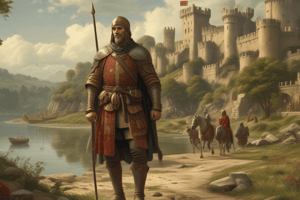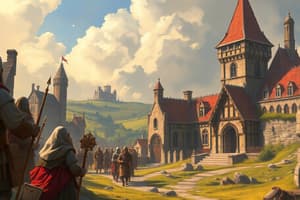Podcast
Questions and Answers
What significant event took place in 1066?
What significant event took place in 1066?
- Battle of Hastings (correct)
- Formation of the Commonwealth of Australia
- Establishment of the first printing press
- Signing of the Magna Carta
The Black Death occurred in the 14th century.
The Black Death occurred in the 14th century.
True (A)
Name the document signed in 1215 that limited royal power.
Name the document signed in 1215 that limited royal power.
Magna Carta
The __________ marks the first known evidence of human life tools made from flakes of flint.
The __________ marks the first known evidence of human life tools made from flakes of flint.
Match the following events with their corresponding dates:
Match the following events with their corresponding dates:
Which event had a direct impact on the social structure of England in 1381?
Which event had a direct impact on the social structure of England in 1381?
Columbus arrived in the Americas in 1492.
Columbus arrived in the Americas in 1492.
What was the outcome of the English Civil War that occurred from 1861 to 1865?
What was the outcome of the English Civil War that occurred from 1861 to 1865?
Flashcards
Celtic Arrival
Celtic Arrival
The arrival of the Celts in the British Isles marked a significant cultural shift.
King Alfred's Victory
King Alfred's Victory
King Alfred the Great successfully defended against Viking invasions, preserving Anglo-Saxon culture.
Battle of Hastings
Battle of Hastings
The Battle of Hastings was a pivotal moment in English history, leading to the Norman Conquest and the establishment of William the Conqueror as king.
Magna Carta
Magna Carta
Signup and view all the flashcards
Hundred Years' War
Hundred Years' War
Signup and view all the flashcards
Black Death
Black Death
Signup and view all the flashcards
Printing Press
Printing Press
Signup and view all the flashcards
Chesapeake Colonization
Chesapeake Colonization
Signup and view all the flashcards
Study Notes
Early Human History & Tools
- 250,000 BC: First evidence of human tools (flakes of flint)
- 55 BC: Roman arrival
- 1400 BC: Drought
- 700 BC: Celts arrive
Prehistoric & Ancient Britain
- 3000 BC: Construction of Henges (including Stonehenge)
- 2400 BC: Stonehenge
- 449 BC: Saxons, Angles, and Jutes invade Britain
- 9th Century: Literacy increased
- 878: King Alfred defeats Vikings
- 1066: Norman conquest; William the Conqueror defeats Harold II
Medieval Britain
- 1000: Beowulf (Old English epic poem)
- 1066: William the Conqueror crowned king at Westminster Abbey.
- 1086: Domesday Book (land survey)
- 6th Century: Christianity arrives.
- 1215: Magna Carta signed
- 1337-1453: Hundred Years' War
- 1381: Wat Tyler's Revolt
- 1485–1603: Tudor Dynasty
- 14th Century: The Black Death
Renaissance & Reformation
- 1476: William Caxton, first printing press in Britain
- 1492: Columbus arrives in the Americas.
- 1513: Battle of Flodden
- 1536: Pilgrimage of Grace
- 1552: New Prayer Book (Protestant Reformation)
Colonialism & Early Modern England
- 1601: Poor Law
- 1606/1607: Colonists depart England for the Chesapeake shore.
- 1608: Colonists search for gold.
- 1609-1610: The Starving Time in Jamestown
- 1619: First arrival of Africans to the Americas
- 1707: Act of Union - Great Britain formed
18th & 19th Century
- 1770: Captain James Cook explores Australia.
- 1776: American Declaration of independence
- 1788: First Fleet arrives in Australia.
- 1801: Act of Union - creates the United Kingdom of Great Britain and Ireland.
19th & 20th Century
- 1829: Australia establishes Perth.
- 1845–1852: Irish Potato Famine
- 1861–1865: American Civil War
- 1863: Battle of Gettysburg
- 1865: Lincoln assassination
- 1901: Federation of Australia
- 1916: Easter Rising in Ireland
- 1920: Government of Ireland Act
- 1922: Irish Free State (later Republic of Ireland)
- 1942: Bombing of Darwin (WWII)
- 1947: Beginning of the Cold War
- 1968: Assassination of Martin Luther King Jr.
Studying That Suits You
Use AI to generate personalized quizzes and flashcards to suit your learning preferences.




